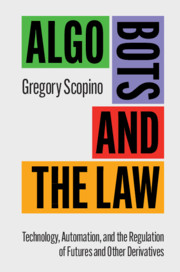Book contents
- Reviews
- Algo Bots and the Law
- Algo Bots and the Law
- Copyright page
- Contents
- Preface
- Introduction
- 1 Key Concepts: Algorithms, Artificial Intelligence, and More
- 2 Economic Definitions of Common Derivatives
- 3 Legal and Regulatory Definitions of Derivatives and Other Financial Instruments
- 4 FinTech: From Science Fiction to Non-Fiction
- 5 The Regulatory Framework for the US Derivatives Markets
- 6 Gateways to the Futures Markets – FCMs
- 7 Collective Investment Vehicles and Investment Advisors
- 8 Salespeople, Supervisors, Owners, and Enumerated Others
- 9 Trading Floor Denizens
- 10 Regulating Digital Intermediaries
- 11 States of Mind: From Zero to Specific Intent
- 12 Market Manipulation: Then and Now
- 13 Fraud Is Many Things (for Humans and Robots)
- 14 Disruptive Trading Practices
- 15 Spoofing: Market Disruption Made Easy by Technology
- 16 Adequately Supervising the Overseers of Algo Bots
- 17 Flash Events
- 18 Algo Bots All over the World
- 19 Conclusion
- Index
13 - Fraud Is Many Things (for Humans and Robots)
Published online by Cambridge University Press: 02 October 2020
- Reviews
- Algo Bots and the Law
- Algo Bots and the Law
- Copyright page
- Contents
- Preface
- Introduction
- 1 Key Concepts: Algorithms, Artificial Intelligence, and More
- 2 Economic Definitions of Common Derivatives
- 3 Legal and Regulatory Definitions of Derivatives and Other Financial Instruments
- 4 FinTech: From Science Fiction to Non-Fiction
- 5 The Regulatory Framework for the US Derivatives Markets
- 6 Gateways to the Futures Markets – FCMs
- 7 Collective Investment Vehicles and Investment Advisors
- 8 Salespeople, Supervisors, Owners, and Enumerated Others
- 9 Trading Floor Denizens
- 10 Regulating Digital Intermediaries
- 11 States of Mind: From Zero to Specific Intent
- 12 Market Manipulation: Then and Now
- 13 Fraud Is Many Things (for Humans and Robots)
- 14 Disruptive Trading Practices
- 15 Spoofing: Market Disruption Made Easy by Technology
- 16 Adequately Supervising the Overseers of Algo Bots
- 17 Flash Events
- 18 Algo Bots All over the World
- 19 Conclusion
- Index
Summary
US laws and regulations prohibit people from lying, deceiving, or otherwise tricking prospective and actual customers in connection with buying or selling futures and other derivatives. For example, the law considers it fraud for a person to solicit money from customers to invest in a hedge fund (i.e., commodity pool) that purportedly will trade stock index futures and then (as actually happened in one 2009 CFTC civil enforcement case) use customer money to instead buy, among other things, a collection of 1,348 rare, stuffed teddy bears for more than $3 million. This prohibition should not be surprising, as just about every financial regulatory regime outlaws fraud. This chapter has to cover more territory than some of the other parts of this book because one of the central purposes behind the regulation of financial markets is the prevention of fraud, which can take many forms.
- Type
- Chapter
- Information
- Algo Bots and the LawTechnology, Automation, and the Regulation of Futures and Other Derivatives, pp. 290 - 325Publisher: Cambridge University PressPrint publication year: 2020

